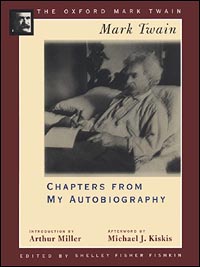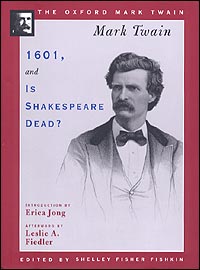
This would be a hilarious beginning to an autobiography, but it actually occurs smack in the middle of Chapters from My Autobiography, which is a randomly ordered assortment of anecdotes dictated by Twain as the mood struck him. They were typed up by secretaries and serialized in the North American Review. It is great stuff, very funny, and focused primarily on the mundane — there are only a few bits about rubbing shoulders with big names (one that comes up, oddly enough, is Lewis Carroll) and lots of "kids say the darnedest things" moments. Fortunately, Mark Twain proves significantly more bearable than Bil Keane in his selection of such. These chapters don't really add up to anything, nor were they intended to; Twain had official biographers who were already attached to his household and preparing to write the official start-to-finish story of his life. I got the sense that, to Twain, working on Chapters wasn't about product so much as process — as he points out, he has survived nearly everyone he talks about: his son, his favorite daughter, his wife, his siblings, his friends... like Allen Mockery, Twain is writing primarily in order to spend a few last moments with the people he has loved who are gone now.
Paired with this trifle to form the volume 1601, and Is Shakespeare Dead? is a tiny story called "Conversation, as it was by the Social Fireside, in the time of the Tudors," which has to be by far the weirdest thing Twain ever wrote. I could describe it, but a scan of a sample paragraph says it all:
 W, as the kids say, tf. "1601," as it has come to be called, is eleven pages of faux-Elizabethan ribaldry. I should have figured something was up when I saw that Erica Jong had written the introduction. Why on earth would Mark Twain write something like this? "1601" was penned at the height of Twain's powers, written in tandem with Adventures of Huckleberry Finn, so it's neither a piece of juvenalia nor something he'd banged out in his senility. If he'd just wanted to write some off-color dialogue, why not set it on a ship or at a mining camp or some such? Why the court of Queen Elizabeth? It can't be that he was trying to disguise his authorship, as he only intended to circulate "1601" among a small circle of friends. Clearly there is more going on here than fart jokes. (Incidentally, "1601" may contain the first funny fart joke I have ever encountered. The humor springs not from the farting, but from the indignant response of the narrator, who fumes, "God damn this wyndy ruffian&all his breed." Even in ancient dialect, the man had a way with a phrase.) It has been hypothesized that "1601" was an outgrowth of all the stuff from the sixteenth century and thereabouts that Twain had read in researching The Prince and the Pauper — he'd encountered material not altogether dissimilar from "1601" and couldn't help but write a parody. I wonder: parody, or homage? The afterword suggests that Twain was quite taken by just how frank people were about shitting and fucking and such back in the Early Modern eras. A moment ago I asked why this story wasn't set at one of the places Twain wrote about so often, where he made clear that rough speech was ubiquitous? Because Twain never actually transcribed any of the cursing he wrote about at such length. Chapters details how everything Twain wrote passed before the eyes of his prudish wife, who was quite liberal in applying her red pencil to potentially objectionable passages. It must have been quite cathartic for Twain to be able to write "cunt" over and over again without worrying about Livy having a heart attack over it. And then there's this, which strikes me as the key line:
 Twain married at thirty-four. According to his biographers, nothing suggests that Twain's own sex life was significantly different from that of anyone else in "the vttermoft parts of America." Parody? Sounds more like a rueful acknowledgement that, thanks to the shift in mores from one time and place to another, the joke was on him.
Return to the Calendar page! |


